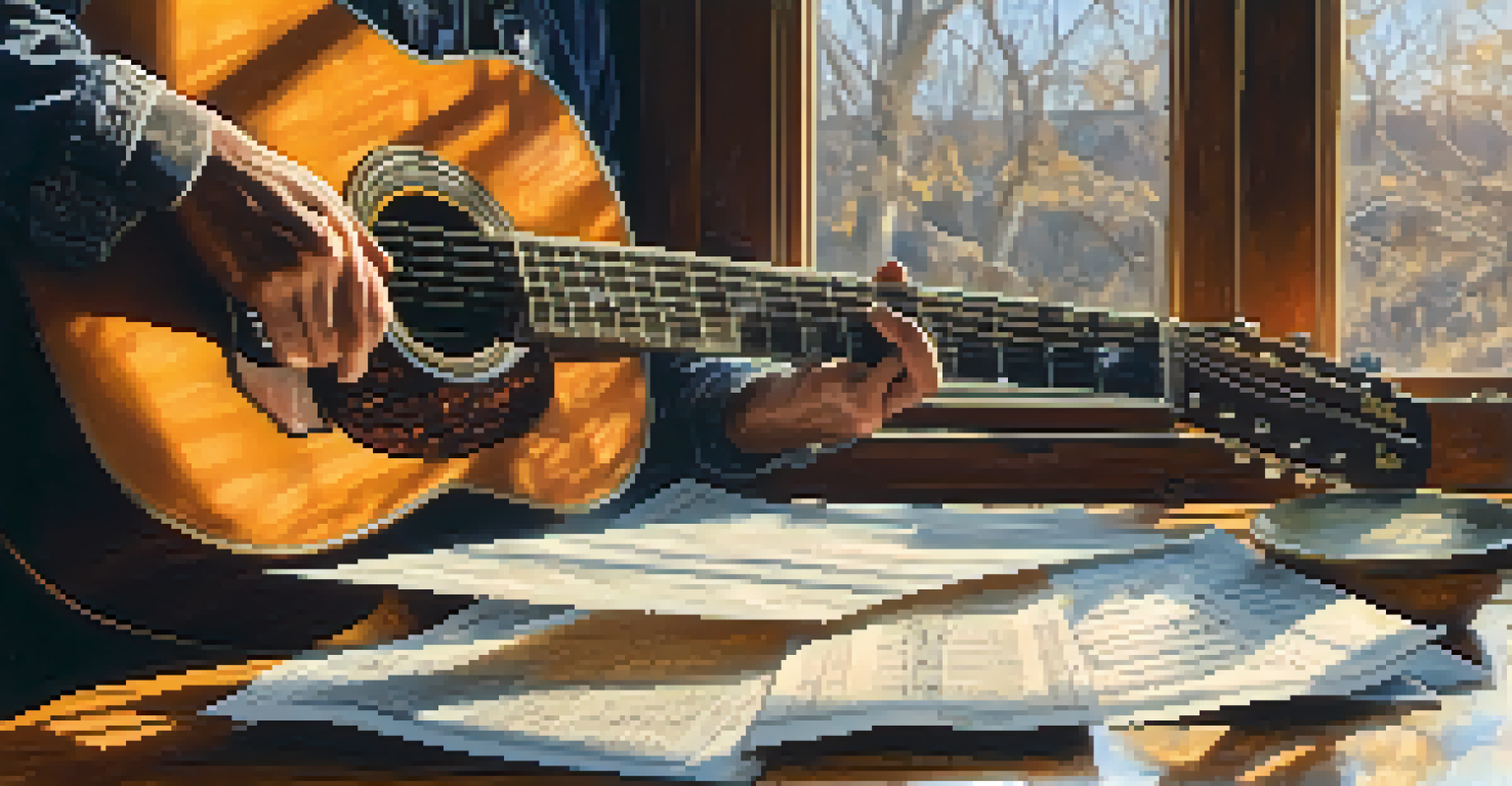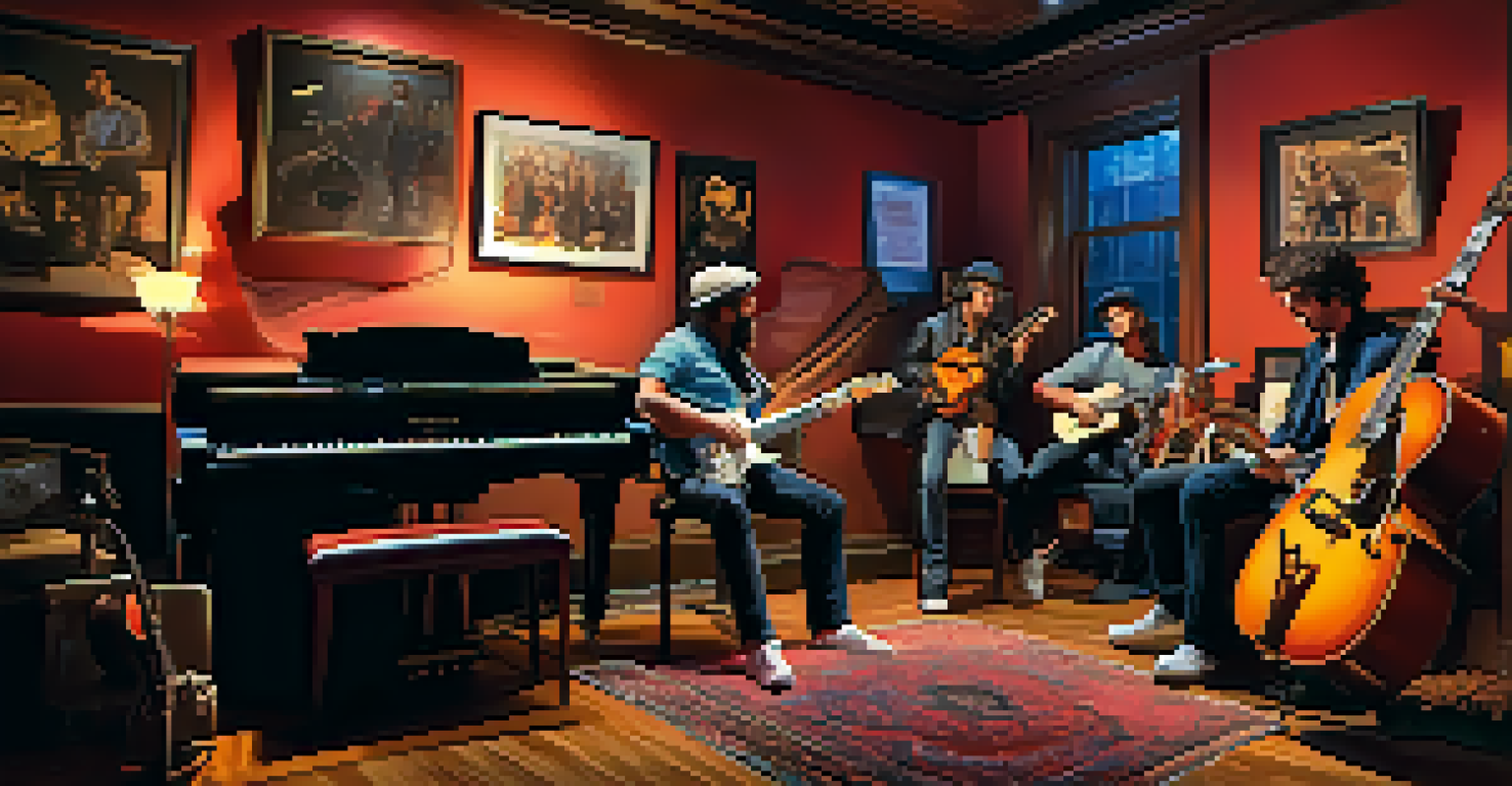Analyzing Classic Rock: Techniques for Guitar Mastery

Understanding the Roots of Classic Rock Guitar
Classic rock has shaped the landscape of guitar playing, with iconic riffs and solos that continue to inspire musicians today. To truly master guitar, it's essential to understand the styles and techniques that define this genre. From the bluesy bends of Eric Clapton to the intricate fingerpicking of Jimmy Page, each guitarist brings a unique flair that can teach us valuable lessons.
Guitar is the easiest instrument to play and the hardest to play well.
By studying the roots of classic rock, you can identify the key elements that make these songs resonate. Look at how artists blend rhythm and melody, and notice how they use techniques like palm muting and hammer-ons to create texture. These foundational skills can elevate your playing and help you develop your own voice on the guitar.
Moreover, understanding the historical context of classic rock gives you insight into the evolution of guitar techniques. You’ll find that many modern styles owe their existence to the experimentation and innovation of classic rock guitarists. This knowledge not only enriches your playing but also deepens your appreciation for the music.
Essential Techniques to Study in Classic Rock
When analyzing classic rock, certain techniques stand out as essential for any aspiring guitarist. Techniques like power chords, slide guitar, and vibrato are staples in the genre, and practicing them will enhance your overall skill set. These techniques are not just flashy; they serve specific musical purposes that contribute to the song's emotional impact.

For example, power chords create a strong, driving sound that’s perfect for rock anthems. By incorporating slide guitar, you can add a smooth, expressive quality to your solos, reminiscent of legends like Duane Allman. Meanwhile, mastering vibrato will bring a new level of emotion to your playing, allowing you to connect more deeply with your audience.
Master Essential Classic Rock Techniques
Practicing key techniques like power chords, slide guitar, and vibrato can significantly enhance your guitar skills and emotional connection to the music.
To effectively practice these techniques, break them down into manageable parts. Focus on one technique at a time, and incorporate it into your playing gradually. This approach will help you integrate these skills seamlessly into your repertoire, making you a more versatile guitarist.
Learning Iconic Riffs and Solos
One of the most enjoyable aspects of mastering classic rock is learning the iconic riffs and solos that have become synonymous with the genre. These memorable phrases are often the first thing that draws listeners into a song, and they can offer valuable lessons in phrasing and timing. By dissecting these riffs, you can gain insight into how to create your own catchy hooks.
Music is the shorthand of emotion.
To get started, choose a few of your favorite classic rock songs and focus on learning their riffs note for note. Pay attention to the nuances, such as how the guitarist uses dynamics and articulation to bring the riff to life. Once you've mastered the notes, try playing along with the original recording to develop your timing and feel.
As you learn these classic riffs, don't hesitate to experiment. Try adding your own twists or blending different styles to make them your own. This blend of homage and innovation is what keeps classic rock alive and relevant, and it will help you develop your unique sound as a guitarist.
The Importance of Listening and Analysis
Listening is a crucial part of mastering classic rock guitar. It’s not just about playing the notes; it's about understanding the music's structure and emotional content. By actively listening to recordings, you can pick up on subtleties that might not be immediately evident when reading tablature or sheet music.
Try to dissect a song by isolating different components, such as the rhythm section, lead guitar, and vocal melodies. This will help you appreciate how each part works together to create the overall sound. Additionally, listening to live performances can reveal how artists interpret their songs in real-time, giving you insight into their improvisational techniques.
Learn from Iconic Riffs and Solos
Dissecting and mastering classic riffs not only improves your playing but also helps you develop your unique musical voice.
Incorporating this analytical listening into your practice routine will deepen your understanding of classic rock. It encourages you to be a more thoughtful musician, allowing you to draw inspiration from your favorite artists while also developing your distinct style.
Utilizing Backing Tracks for Practice
Backing tracks are a fantastic resource for guitarists looking to practice classic rock techniques in a more dynamic setting. These tracks provide a full-band experience, allowing you to experiment with improvisation and applying the techniques you've learned. They can help you develop your timing, confidence, and overall musicality.
To get started, find backing tracks that match the style of classic rock you're interested in. You can search online for free resources or invest in a few quality tracks that suit your preference. Once you have your tracks, start playing along, focusing on incorporating the techniques you've been practicing, such as bends, slides, and dynamics.
As you play along with backing tracks, challenge yourself to improvise and create your own solos. This will help you build a personal style while also reinforcing your skills in a practical context. Over time, you'll find that this practice method enhances your creativity and prepares you for playing with other musicians.
Collaborating with Other Musicians
Collaboration is one of the most rewarding aspects of being a guitarist, especially in the classic rock genre. Playing with other musicians exposes you to different styles, techniques, and perspectives that can help you grow as an artist. Whether you’re jamming with friends or joining a local band, these experiences can be invaluable for your development.
When collaborating, don’t hesitate to share your knowledge and techniques with others. Teaching is a powerful way to reinforce your own understanding and inspire those around you. Additionally, be open to learning from your fellow musicians; each person brings their unique flair, and you can gain new insights that may enhance your playing.
Value Collaboration and Goal Setting
Collaborating with other musicians and setting clear practice goals can accelerate your growth as a guitarist in the classic rock genre.
These collaborative sessions can also lead to creative breakthroughs and new musical ideas. Embrace the spontaneity of playing with others, and you may find your confidence and skills expanding in ways you never anticipated. Remember, every jam session is a learning opportunity!
Setting Goals and Tracking Progress
As with any skill, setting clear goals is essential for mastering guitar techniques in classic rock. Begin by identifying specific areas you want to improve, such as learning a particular song or refining a technique. Having tangible goals keeps you motivated and focused during your practice sessions.
To track your progress, consider keeping a practice journal. Documenting your sessions, noting what you worked on, and reflecting on your achievements can provide valuable insights. This practice not only helps you stay organized but also allows you to celebrate your improvements, no matter how small.

Remember to be patient with yourself as you work toward your goals. Mastery takes time, and progress can often feel slow. However, by consistently setting goals and tracking your achievements, you’ll find that your skills will grow, and your love for classic rock guitar will deepen.